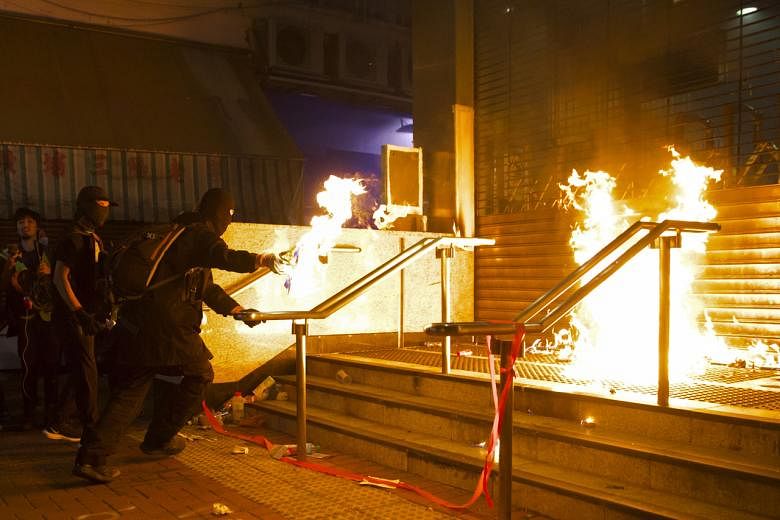HONG KONG (BLOOMBERG) - Damage to Hong Kong's subway from six months of protests will cost operator MTR Corp about HK$1.6 billion (S$278 million), the company said in a filing to the Hong Kong stock exchange on Thursday (Dec 5).
The mass-transit operator said it expects its 2019 profit to be less than a year ago because of the social unrest, which has affected its transport operations as well as retail and rental businesses.
MTR said its overall financial position remains sound, though passenger use of its services from July to November slumped 14 per cent from a year earlier.
Hong Kong's subway system has been targeted during the anti-government demonstrations, with sometimes violent clashes between police and protesters leaving stations badly damaged. Traffic on the metro system slid by the most on record last month as MTR closed lines early and suspended train services.
MTR shares, however, jumped 3.8 per cent on Friday, the most since Sept 4, after Goldman Sachs Group said the company is poised to recover quickly when Hong Kong's situation eventually settles.
MTR shares - once one of Hong Kong's safest stock bets - have fallen almost 20 per cent from a record high in July as violent clashes escalated.
Goldman analysts, who upgraded the stock to buy from neutral, said in a research note that looking at Hong Kong conglomerates, MTR had the ability to recover more rapidly than other companies from the impact of the unrest. It warned, however, that normalisation would depend on how long the current situation continues.
MTR has six buy, three hold and two sell ratings, according to data complied by Bloomberg.
"As the monopolistic railway company capturing half of public transportation traffic", MTR should see traffic recover quickly as the situation in Hong Kong improves, analysts led by Simon Cheung wrote in the note on Wednesday. They cited the 2003 Sars epidemic as an example where MTR patronage rose by 2 per cent in July that year after dropping 20 per cent in April.
MTR caters towards domestic spending, unlike travel-related businesses that depend on tourist arrivals, which might take longer to recover, the analysts said, adding that the company has also locked in profits on property sales and may see some upside from rail expansion plans.
Hong Kong's situation remains unclear, however. Leader Carrie Lam didn't make any new concessions to protesters after pro-democracy forces won a landslide in local elections, a move that risks leading to further violence.
In the same report, Goldman analysts said they remain cautious on Hong Kong's retail and office sectors and revised lower earnings estimates for conglomerates under coverage, warning of an additional earnings impact of as much as 8 per cent if protests persist for another six months.
In the note, Goldman said it sees more downside risks for Wharf Holdings, Swire Pacific and Jardine Matheson Holdings. It downgraded Cheung Kong Infrastructure Holdings to neutral from buy, citing risks to growth.










